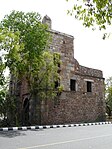ITO metro station

The Dabur ITO metro station is a station on the Delhi Metro, under the Violet Line. It was inaugurated on 8 June 2015 by the then Urban Development Minister M Venkaiah Naidu and Delhi Chief Minister Arvind Kejriwal. The ITO metro station was one of the most awaited stations of the Delhi Metro under Phase III expansion. Whereas the opening of the Mandi House metro station, which is also an interchange station now, took a chunk of the load off the Rajiv Chowk metro station. The ITO metro station is expected to take some of the surface traffic off the ITO intersection, which witnesses heavy traffic jams due to a number of private and commercial vehicles, coming from South and East Delhi, which is the main arterial road for the people residing in those areas. According to Delhi Police, the ITO intersection is one of the most congested areas in the city, with the entire flow of traffic from east Delhi to the rest of the city and vice versa. going through this intersection. Over 1.75 lakh vehicles use the ITO intersection every day. With the opening of the ITO metro station, a number of commuters whose offices are located in the ITO area as expected to switch to the metro. As per estimates of the Delhi Metro, around 25,000 commuters are expected to use the station by 2016. The number will go up to over 35,000 by 2021, said a Delhi Metro official.
Excerpt from the Wikipedia article ITO metro station (License: CC BY-SA 3.0, Authors, Images).ITO metro station
Bahadur Shah Zafar Marg,
Geographical coordinates (GPS) Address Nearby Places Show on map
Geographical coordinates (GPS)
| Latitude | Longitude |
|---|---|
| N 28.629371388889 ° | E 77.241319805556 ° |
Address
Bahadur Shah Zafar Marg (Maharao Krishna Rao Marg)
Bahadur Shah Zafar Marg
110002
Delhi, India
Open on Google Maps







